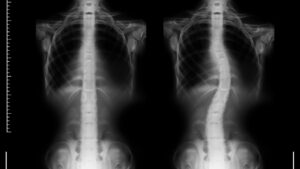When it comes to spinal health, most people think of posture, exercise, and chiropractic care. While these are crucial, nutrition plays a significant role in keeping your spine strong, flexible, and pain-free. The food you eat directly impacts bone strength, muscle function, and inflammation levels, all of which contribute to spinal health.
Essential Nutrients for a Healthy Spine
To maintain a strong and resilient spine, ensure your diet includes the following nutrients:
1. Calcium & Vitamin D – Building Blocks of Strong Bones
- Calcium strengthens vertebrae and prevents conditions like osteoporosis.
- Vitamin D enhances calcium absorption, reducing the risk of fractures.
- Sources: Dairy products, leafy greens, almonds, fortified cereals, and sunlight exposure for vitamin D.
2. Omega-3 Fatty Acids – Reducing Inflammation
- Chronic inflammation can contribute to back pain and spinal degeneration.
- Omega-3s help reduce inflammation and improve joint mobility.
- Sources: Fatty fish (salmon, sardines), flaxseeds, walnuts, and chia seeds.
3. Magnesium – Muscle Function and Relaxation
- Helps maintain muscle and nerve function, reducing muscle tension and spasms.
- Prevents stiffness in the spine and supports energy production.
- Sources: Nuts, seeds, whole grains, dark chocolate, and spinach.
4. Protein & Collagen – Supporting Connective Tissues
- Essential for muscle repair and strengthening spinal discs.
- Collagen supports ligaments, tendons, and cartilage health.
- Sources: Lean meats, poultry, eggs, bone broth, and legumes.
5. Antioxidants & Vitamin C – Preventing Degeneration
- Protects spinal discs and tissues from oxidative stress.
- Aids in collagen production for healthy ligaments and cartilage.
- Sources: Berries, citrus fruits, bell peppers, and leafy greens.
Hydration and Spine Health
Water is crucial for spinal health. The discs between your vertebrae are made mostly of water, and dehydration can lead to disc degeneration and back pain. Aim to drink at least 8 glasses of water daily to maintain proper spinal hydration and flexibility.
Foods to Avoid for Better Spine Health
Certain foods can contribute to inflammation and weaken bone health:
- Processed foods high in sugar and unhealthy fats
- Excessive caffeine that can deplete calcium levels
- High-sodium foods that may lead to bone density loss
- Sugary beverages that contribute to inflammation
How Chiropractic Care and Nutrition Work Together
Proper nutrition, combined with regular chiropractic care, creates a solid foundation for spinal health. Chiropractic adjustments ensure proper spinal alignment, reducing stress on the body, while good nutrition provides the necessary nutrients for recovery and strength.
Take Charge of Your Spine Health Today!
A balanced diet and proper spinal care go hand in hand. If you’re experiencing back pain or want to improve your spinal health, consider chiropractic care as part of your wellness routine. Book a consultation today and take the first step toward a healthier spine and a pain-free life!


